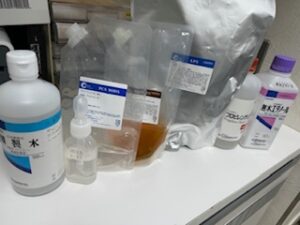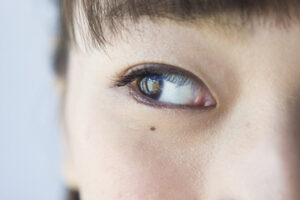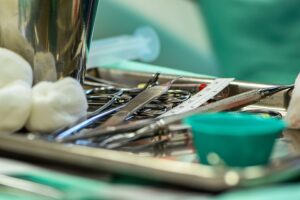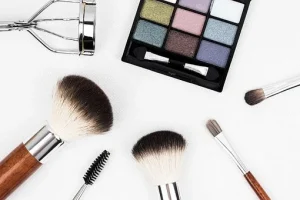2024/01/09
Making doctor's cosmetics in the hospital
Reading Time: <1 minute Our hospital has been manufacturing doctor's cosmetics in-house since we opened our doors.
We purchase cosmetic raw materials from raw material manufacturers and mix them within our clinic facilities to produce lotion-type vitamin C derivative lotions, which are basic cosmetics.
There are few doctors who are familiar with the basic knowledge of weight loss and manufacturing methods for manufacturing cosmetics, and even those who do not have the knowledge of private practitioners can easily create doctor's cosmetics in the hospital. Cosmetic production tips] We have released the video VIDO of volume 3 of the series.
The advantage of in-house manufacturing is that it is possible to make fine adjustments, adjust the amount of methylparaben with preservatives, change to phenoxyethanol, etc., and manufacture what he calls preservative-free formulations.
General cosmetics contain various preservatives to ensure a three-year shelf life.
It has the advantage of being able to produce so-called raw cosmetics, and is suitable for those who are reluctant to add preservatives.
However, you should be careful with cosmetics that do not contain any preservatives, as they are prone to oxidation and may even be harmful to your skin.
As long as you are practicing cosmetic dermatology, a minimum knowledge of cosmetic ingredients and manufacturing is essential.
Our hospital has been manufacturing doctor's cosmetics in-house since we opened our doors.
We purchase cosmetic raw materials from raw material manufacturers and mix them within our clinic facilities to produce lotion-type vitamin C derivative lotions, which are basic cosmetics.
There are few doctors who are familiar with the basic knowledge of weight loss and manufacturing methods for manufacturing cosmetics, and even those who do not have the knowledge of private practitioners can easily create doctor's cosmetics in the hospital. Cosmetic production tips] We have released the video VIDO of volume 3 of the series.
The advantage of in-house manufacturing is that it is possible to make fine adjustments, adjust the amount of methylparaben with preservatives, change to phenoxyethanol, etc., and manufacture what he calls preservative-free formulations.
General cosmetics contain various preservatives to ensure a three-year shelf life.
It has the advantage of being able to produce so-called raw cosmetics, and is suitable for those who are reluctant to add preservatives.
However, you should be careful with cosmetics that do not contain any preservatives, as they are prone to oxidation and may even be harmful to your skin.
As long as you are practicing cosmetic dermatology, a minimum knowledge of cosmetic ingredients and manufacturing is essential.
 Our hospital has been manufacturing doctor's cosmetics in-house since we opened our doors.
We purchase cosmetic raw materials from raw material manufacturers and mix them within our clinic facilities to produce lotion-type vitamin C derivative lotions, which are basic cosmetics.
There are few doctors who are familiar with the basic knowledge of weight loss and manufacturing methods for manufacturing cosmetics, and even those who do not have the knowledge of private practitioners can easily create doctor's cosmetics in the hospital. Cosmetic production tips] We have released the video VIDO of volume 3 of the series.
The advantage of in-house manufacturing is that it is possible to make fine adjustments, adjust the amount of methylparaben with preservatives, change to phenoxyethanol, etc., and manufacture what he calls preservative-free formulations.
General cosmetics contain various preservatives to ensure a three-year shelf life.
It has the advantage of being able to produce so-called raw cosmetics, and is suitable for those who are reluctant to add preservatives.
However, you should be careful with cosmetics that do not contain any preservatives, as they are prone to oxidation and may even be harmful to your skin.
As long as you are practicing cosmetic dermatology, a minimum knowledge of cosmetic ingredients and manufacturing is essential.
Our hospital has been manufacturing doctor's cosmetics in-house since we opened our doors.
We purchase cosmetic raw materials from raw material manufacturers and mix them within our clinic facilities to produce lotion-type vitamin C derivative lotions, which are basic cosmetics.
There are few doctors who are familiar with the basic knowledge of weight loss and manufacturing methods for manufacturing cosmetics, and even those who do not have the knowledge of private practitioners can easily create doctor's cosmetics in the hospital. Cosmetic production tips] We have released the video VIDO of volume 3 of the series.
The advantage of in-house manufacturing is that it is possible to make fine adjustments, adjust the amount of methylparaben with preservatives, change to phenoxyethanol, etc., and manufacture what he calls preservative-free formulations.
General cosmetics contain various preservatives to ensure a three-year shelf life.
It has the advantage of being able to produce so-called raw cosmetics, and is suitable for those who are reluctant to add preservatives.
However, you should be careful with cosmetics that do not contain any preservatives, as they are prone to oxidation and may even be harmful to your skin.
As long as you are practicing cosmetic dermatology, a minimum knowledge of cosmetic ingredients and manufacturing is essential.
2021/03/01
We have increased inquiries about moles.
- mole, Mole removal, Petite shaping, Mole, mole removal, Mole removal, Laser treatment, Plastic surgery, Carbon dioxide laser, Pathological diagnosis, Skin tumor, Cosmetic Surgery, Cosmetic surgeon, Cosmetic Surgery Society, cosmetic surgery, Cosmetic dermatology, Kuroko, Kuroko-tori, Mole removal

Reading Time: <1 minuteAs the new coronavirus infection spread, people began covering their faces with masks, leaving only the eyes exposed.Many companies require employees to wear masks indoors.Currently, the number of patients undergoing mole removal is rapidly increasing.Carbon dioxide laser treatment is famous for the removal of moles, but at our clinic, we use heat ablation treatment using electronic energy or thulium laser (Lavieen), which leaves fewer scars and can be removed reliably in a short time compared to carbon dioxide laser. We recommend tissue ablation treatment.
>>About mole removal
All-you-can-remove moles are carried out for a fixed fee.At medical institutions, removal using a carbon dioxide laser is common, but there is a possibility that a very noticeable hypertrophic scar will remain, so careful consideration is required.There are many patients who come to our clinic for consultation regarding hypertrophic scars that have been caused by moles being removed using carbon dioxide laser. CO₂ or carbon dioxide laser mole removal is called his laser and has a cutting-edge image, but it has been used clinically for over 25 years.In a sense, it is an old-fashioned treatment that carefully removes moles and is not necessarily recommended as the first choice.In fact, more than XNUMX years ago, I used a domestically produced carbon dioxide laser system developed by Japan Infrared Industry Co., Ltd. (Neek), which was sold at a list price of about XNUMX million yen at the time, to remove moles.When I started working as a cosmetic surgeon, the basic treatment for mole removal was excision, so the carbon dioxide laser system, which allows moles to evaporate and disappear simply by irradiating them with a laser beam, was revolutionary and magical. It looked like a piece of equipment.Scars are less noticeable than open surgery, and over XNUMX years ago, scar healing was not as much of a problem.There was a time when patients who underwent laser treatment were satisfied as long as the size and color of their moles improved.However, now that there are systems that can remove it more cleanly, the issue of scars such as hypertrophic scars caused by carbon dioxide laser removal has come into focus.I am also reluctant to continue using the same treatment method I used XNUMX years ago.Currently, raised moles are mainly removed using a treatment method that evaporates the mole tissue using heat generated by radio frequency electronic energy.For flat moles, laser irradiation with a medium called thulium is used to vaporize and remove the tissue.Moles are diagnosed using a device called dermoscopy.If malignancy is suspected, the affected area must be removed by excision or hollowing out and pathological examination performed to confirm the diagnosis.For tumors that have been definitively diagnosed as benign, we do not remove only the mole, but choose ablation with electronic energy or treatment with thulium laser.Aftercare involves applying a medical sticker for several days and applying moist therapy, without disinfecting the affected area.Disinfecting wounds can delay wound healing and increase the risk of infection due to tissue damage caused by disinfectants.The most common reason to remove a mole is for aesthetic purposes, but there are also cases where fortune telling recommends removal, or when there are symptoms such as itching or pain.Mole removal does not mean that all scars will heal in the same way and become less noticeable.Depending on the area of the body, the scar may bulge and become a hypertrophic scar, so careful consideration is required before surgery.On the face, scars are most likely to be visible around the mouth, lower jaw, and above the cheekbones.On the body, scars tend to be more noticeable on the shoulders, over the deltoid muscles, and over the sternum, and the reason for this is that the skin is so tense that it constantly pulls on the surrounding areas.Particularly in these areas, there are many cases where the scar heals as a white bulge called a hypertrophic scar.Depending on the location, excision surgery can also cure the mole with almost no scarring, so if the mole is too large, surgery may be necessary.It is difficult to remove the tip of the nose because there is cartilage just below it, so treatment methods other than removal must be selected.Mole removal is not a difficult cosmetic surgery procedure, but there are many points to be careful of, such as post-operative care and selection of the surgical site. We recommend that you take it.
contact@sakae-clinic.com
phone:0120566680
2019/06/08
Cosmetic surgery and cosmetic dermatology Actual situation of trouble No.23

Reading Time: <1 minute
Vicious infiltration staff aimed at beauty clinics
The beauty clinic receives many applications and inquiries from people who wish to work as staff.Is it becoming a dream job for women?However, some people targeted beauty clinics and tried to become staff members in order to demand unfair payments. K was a woman in her XNUMXs who wanted to work as a receptionist and counselor at a clinic.At the time of the interview, she didn't make much of an impression on me, but since she really wanted to work at a beauty clinic, she was persistently asking for a chance to work, so she decided to attend the orientation. became.Orientation consists of actually explaining the work at the clinic, viewing DVDs, and observing reception work for the number of days and times that the patient desires.Orientation is an opportunity to confirm the job content and clarify whether you can continue working. K persistently asked for more days of orientation and repeatedly expressed his desire to work at the clinic no matter what.At first she thought she was having a hard time and she was motivated to do the job, but she started making horrible comments to the staff during orientation. She began to slander and reveal the internal affairs of a certain beauty clinic where she had worked for about two weeks.Moreover, she started talking about how she was an extremely unscrupulous clinician who had been forced to quit her job due to harassment and bullying.She began to persistently say that the previous clinic was unforgivable, that it was unscrupulous, and that they were doing something outrageous.She started talking about specific management information and patient information, and it became clear that K had no concept of respecting personal information.Of course, such a person would be impossible to hire in a medical institution, which must respect patient privacy and personal information more than any other company.Also, during K's orientation, she really wanted to have a beauty treatment, so she requested the treatment.Of course, it later turned out that K. had no intention of paying for the treatment even though she had to pay for it.After the orientation, when I told K that I couldn't hire him, his attitude suddenly changed and he went home cursing me, saying that he couldn't understand the work because you guys didn't teach him well, and that you guys were terrible staff.A few days later, K sent a threatening letter to the clinic. It was stated that legal action would be taken if the salary was not paid within three days (there was no time card, and there was no agreement on hourly wages, etc., and he was conducting the orientation on the date K had requested). was.There was also a hint of third party intervention.After that, we received a report from the Labor Standards Inspection Office that K had complained that his salary had not been paid, and we had an interview with the person in charge. The person in charge's explanation revealed that K had made an outrageous false report, claiming that she had performed medical procedures even though she was not a nurse.It was also discovered that he reported during orientation that he worked days when he did not come to the clinic at all.He submitted a slander to the Labor Standards Inspection Office for harassment.The person in charge of the Labor Standards Inspection Office was also surprised by K's bad behavior.It turned out that the report was completely fabricated, and he asked that no workplace be victimized by similar tactics in the future.I immediately contacted the director of my previous workplace and was able to hear about the background and circumstances surrounding K's resignation.He was told that he had been fired from the company because of a similar problem in which he swore at the staff. We were deeply concerned about K's unfair behavior, so we conducted a thorough investigation, and new facts came to light one after another.The patient slandered the cosmetic surgery clinic on the grounds that he had previously visited the clinic for counseling as a preview (which he denied when questioned by the staff), and that he underwent surgery at another cosmetic surgery clinic as a monitor and was not satisfied with the results. It has become clear from information from related parties that he was evading his responsibilities as a monitor... He committed illegal acts targeting beauty clinics and was addicted to profit.He immediately informed K by certified mail that he would file criminal charges if he engaged in any inappropriate behavior, and K's harassment stopped.He was preparing to immediately file a criminal complaint with the authorities if further defamatory acts were to occur.It is expected that many clinics other than our three clinics have been affected by K.It was a shocking incident to discover that there were people who infiltrated the clinic through various means such as orientation, staff, and monitors, and used the information to blackmail her and obtain unfair profits.In order to absolutely protect patients' personal information, we believe that it is necessary to have a policy that takes strict action against such individuals.2019/06/08
Horrible medical practice hidden in cosmetic surgery, 2

Reading Time: <1 minute
~ What causes the cosmetic surgery death? Exploring the reality The horrible medical practice hidden in discounted cosmetic surgery
There is no other type of medical care where the price varies between clinics as much as cosmetic surgery and cosmetic dermatology.At a certain cosmetic surgeryDouble fenceThe surgery is 18 10,000 yen, and in certain cosmetic surgery, 9800 yen,Botox injectionOne cosmetic surgery clinic costs 1 yen, while another costs 3000 yen.What is the difference?I feel that the low-cost, low-quality cosmetic surgery business is destroying the future of cosmetic surgery. PRP therapywill be done for 3 yen.Even though the kit costs more than 3 yen... This system naturally reduces the quality of the kit to the absolute minimum and does not follow the steps that should be taken.There are cosmetic surgery clinics that use ineffective dental kits and simple blood collection tubes.Of course, you won't expect much of an effect.An even bigger risk is hidden behind the procedure.Recently, I received a treatment using a system called Fraxel 2 at a rapidly growing cosmetic surgery clinic that sells discount cosmetic treatments, and the redness, swelling, and pain that felt like a burn continued for more than two weeks, which was really painful. A patient came to our hospital for a consultation.Naturally, the patient's face has pigmentation, and the expected effect is not felt at all.I regretted getting the treatment because I was lured by a discounted price in a magazine advertisement.Surprisingly, at the cosmetic surgery clinic, nurses, not doctors, explain the procedures. Fractional laserIt is one of the treatments that involves some risks in cosmetic dermatology, as it can cause downtime.Even if under the supervision of a doctor, a person without medical qualifications may provide treatment.Fractional laserIt is not permitted under the Medical Practitioners Act to irradiate patients with radiation.A clear violation of the Medical Practitioners Act.This is a terrible act devised to attract customers by discounting treatment costs.When I contacted the sales representative regarding this procedure and equipment, he told me to have the procedure performed by a doctor if possible.The answer is...When I asked if it was a risky treatment that should definitely be performed by a doctor rather than by him, the person in charge probably thought it was a bad idea...well, that's right.I slurred my words. Fractional laserIt is absolutely impossible for a nurse to be able to administer the correct irradiation.This is because it is a treatment that should be performed while making a diagnosis, and then changing the setting power, irradiation density, and path after observing the reaction of the skin.No nurse is capable of properly diagnosing skin reactions and operating the treatment system.Once the equipment sells, it's up to you how you use it and who uses it.Am I the only one who thinks it's too cruel?In order to avoid compromising the quality of aesthetic medicine at the clinic, it is necessary for the specialist to take responsibility and carefully perform the treatment while examining the patient.This limits the number of patients we can treat in one day.Naturally, it is unavoidable that beauty treatment costs will be a certain amount due to management reasons.Many advertisements with flashy discounts have been published in local monthly magazines, but it is our clinic's policy to never carry out similar advertisements or PRs. I think you should be careful.As local medical care is collapsing, the time has come for the government and the media to issue a strong warning against the influx of doctors into cosmetic medicine, who perform low-quality cosmetic treatments in order to earn high fees based on their inexperience. I think so.Recently, we have seen a sudden increase in the number of consultations from patients who are suffering from problems that have occurred due to discounted beauty treatments.I hope that patients who read this column will take the time to think carefully before undergoing cosmetic treatment.Healthcare should not be dominated by discounts.We believe that medical care should continue to provide patients with the same level of service that they can provide to their own family.2019/06/08
Cosmetic Surgery and Cosmetic Dermatology Troubles (Special Column)

Reading Time: <1 minute
~ Causes of cosmetic surgery deaths? Explore the reality. Terrible medical practice hidden in discounted cosmetic surgery
! ! ! Emergency column! ! ! The other day, various media outlets reported on a fatal accident at S Cosmetic Surgery Clinic, a major cosmetic surgery chain.There were two fatal accidents last year, and S Cosmetic Surgery has already had many fatal accidents due to cosmetic surgery.We are a well-known clinic group in the industry that performs discount cosmetic surgery by completely reducing the quality of manualized medical care.They never hire experienced cosmetic surgeons, and they are also famous for not holding any academic study sessions or exchanging opinions.It is also a cosmetic surgery clinic that is famous for performing extremely sloppy surgeries.Of course, there are very few cases in which doctors belonging to this cosmetic surgery group present or participate in academic conferences.This is because it would be a disadvantage to this cosmetic surgery group to never learn or introduce legitimate cosmetic surgery.In other words, his low-cost, low-quality, profit-earning business model has been created in which the company pursues only the benefits for management, not the benefits for patients.Doctors from this cosmetic surgery clinic group who have opened their own cosmetic surgery clinics often operate their cosmetic surgery clinics using similar customer attraction methods and surgical methods.Not only patients who have undergone surgery at S Cosmetic Surgery, but also many patients who have undergone surgery by S Cosmetic Surgery doctors and come to me with extremely unnatural conditions, come to me for correction. A self-proclaimed cosmetic surgery specialist who performs similar cosmetic surgery procedures, recognizing that what he has learned and experienced at S Cosmetic Surgery is the best.It seems that there are some doctors who call themselves charismatic.If you perform liposuction surgery on 2009 people, are all XNUMX people really satisfied? What is the level of your cosmetic surgery experience compared to the current level of cosmetic surgery?Cutting corners to reduce costs poses a huge risk for patients in addition to financial benefits. S Cosmetic Surgery repeatedly advertises with the best technology and advertisements, but doctors with the best technology refuse solid aftercare at extremely low surgery fees and only provide the lowest priced medical materials. We do not perform any cosmetic treatments that we employ.Neither the Japanese Society of Cosmetic Surgery nor the Japan Association of Cosmetic Surgery Physicians has ever evaluated this cosmetic surgery clinic as having the best technology. My cosmetic surgeon friends have also experienced many patients who had major problems at the S Cosmetic Surgery Clinic and had to undergo corrections.A XNUMX-year-old woman died due to liposuction.This is an incident that should be taken seriously. Is it really legitimate to recommend liposuction to someone as old as XNUMX?Is it justified to ignore aftercare?Were the necessary tests such as blood tests and electrocardiograph tests performed before the surgery?Was the surgery performed appropriately under the strict supervision of an experienced doctor? I feel like I'll never get a satisfactory answer from S Cosmetic Surgery. In addition to S Cosmetic Surgery, a major accident occurred in XNUMX at a cosmetic surgery group in the Kanto area that sells discounts.The accident appears to have occurred due to the lack of a cosmetic surgery specialist or instructor, who did flashy advertising to attract customers and performed crude anesthesia.Are there any benefits to discount medical care?Do patients really understand the risks?It is a fact that many of the medical accidents caused by cosmetic surgery have occurred at cosmetic surgery clinics where the quality of medical care has declined due to price competition.There may be a surprising number and content hidden in the actual number of fatal accidents at cosmetic surgery clinics that offer discounted, low-cost cosmetic surgery, including S Cosmetic Surgery Clinic.The future development of cosmetic surgery will require us, cosmetic surgery specialists, to once again carefully assess the quality of medical care and provide reassuring medical care from the patient's perspective, now more than ever.As a cosmetic surgeon, you must have the humility to refrain from performing surgery unless you have the proper skills, knowledge, experience, and the ability to reliably deal with any problems that may arise.I hope that the perception that cosmetic surgery is scary, that it is an outrageous medical practice, and that cosmetic surgery is anti-social medicine will not spread.2019/06/08
Cosmetic surgery and cosmetic dermatology Actual situation of trouble No.20

Reading Time: <1 minute
Aesthetic surgeon's ability and care of cosmetic surgery suture wound
Cosmetic surgeons are not professionals just because they are good at cosmetic surgery.It is also essential to work on how to properly heal suture wounds caused by cosmetic surgery.This is the so-called final finishing touch.A person who specializes in suturing without leaving any scars should be the most professional of all surgeons.However, do most cosmetic surgeons really pay close attention to their patients' scars?Some cosmetic surgeons believe that fine suturing will make the suture wound clean.There are some areas that should not be sutured.If the sutures are too small, the blood circulation in the suture wound will deteriorate, causing the suture site to open and potentially staining the scar.After the surgery, some cosmetic surgeons carefully disinfect the sutured wounds.Disinfection is poisonous to the wound and should never be performed on sutured wounds.This behavior is common among self-proclaimed cosmetic surgeons who have transferred from non-surgical departments such as internal medicine, psychiatry, pediatrics, and dermatology.Disinfecting sutures may open the wound and significantly delay healing.An even worse practice is to apply gauze or sofratulle directly to the suture wound.The suture wound dries and healing is significantly delayed.What's more, when you remove the gauze or sofratulle, there is an increased risk of bleeding, pain, and opening of the wound.Furthermore, a cosmetic surgeon applies steroid cream to the sutured wound.Creams contain irritating substances called surfactants, which will definitely make the wound worse.A cosmetic surgeon uses dissolvable sutures to stop the process.This is an impossible act.Especially, you don't have to come for phimosis surgery anymore!This is being done at a medical institution that claims that there is no need to go to the hospital.Dissolvable sutures do not require removal.However, if this thread remains in the wound, it will definitely cause inflammation to the surrounding skin and the suture wound will become dirty.This is a suture material that a cosmetic surgeon with common sense knowledge and morals would never use.There are many patients who are worried about the unsightly sutures left after cosmetic surgery.There are some cosmetic surgeons who have no knowledge of wound care, and even if they do have the knowledge, they do not dare to carry out the procedure due to the loss of time and cost.Patients who pay expensive cosmetic surgery fees have the right to receive the highest level of suture wound care, but it seems that in many cases patients do not pay attention to the suture wounds. .Many new dressings are now available that dramatically improve wound healing.No bathing restrictions are required.Please do not take a bath for one week after surgery.A cosmetic surgeon says something outrageous. The suture wound will become epithelialized within XNUMX hours, so you can take a normal bath from the third day.Cleaning the wound in the shower will remove dirt and reduce the risk of infection.I have never seen a case where an infection was caused by taking a bath.Be careful if there is a cosmetic surgeon who disinfects the suture wound, directly covers the suture wound with gauze, uses Sofratulle, or restricts bathing for a long period of time.You may have to protect the suture wound yourself.Surgical scars vary tremendously depending on the threads used, covering materials, treatment methods, etc.I would like patients undergoing surgery to be aware of this care for suture wounds. From XNUMX years of experience as a cosmetic surgeonProper suture wound careI would like to continue to serve in the future. https://www.sakae-clinic.com/wound/index.html2019/06/08
Cosmetic Surgery and Cosmetic Dermatology Actual situation of trouble No19

Reading Time: <1 minute
Scared Kramer patient
Cosmetic surgery clinics must also deal with aggressive and persistent complaints from unreasonable complainers.A claimer may initially intend to receive a free beauty treatment and file a complaint after the treatment, or he may change his mind midway through and make unreasonable demands to the medical institution and demand a refund of the treatment costs.In any case, it seems that these types of complainers often request returns and refunds for products that have been extensively used, even at stores other than medical institutions.Both hotels and department stores have complaint countermeasure manuals.This is a case where even the slightest mistake is blamed on the victim and the accommodation fee is waived or compensation is requested.Unfortunately, in a private clinic like ours, it is absolutely impossible for a patient to be treated as a complainer from the beginning, so we have not taken sufficient measures and have fallen prey to complainers. .There are actually complaints that specifically target people in the medical field.Since the stain cannot be completely removed by treatment, please refund the treatment fee in full.There was a patient who made this persistent request.As for the treatment cost, even though he received the treatment at a discounted campaign price, did he make a planned complaint asking for a refund after the treatment?Makes me suspect. They say something outrageous: ``Even though I received counseling that said the stains would be completely removed, the stains still aren't coming off!''First of all, as a doctor, I cannot guarantee that the stain will be completely removed.This is because there are some stains like melasma that are extremely difficult to eliminate and can only be controlled.In addition, there are many cases where just thinning the area is enough to be effective.There are regular complainers who make aggressive complaints about even the slightest remaining stains.They unilaterally insist on things that are convenient for them, such as the staff's poor response, lack of explanation, too high costs, or the fact that what they are saying is wrong.Some patients even make threatening complaints.Up until now, I had thought that I would have to accept a refund due to the risk of having to spend time with such unreasonable patients, but as a medical institution, I would like to provide a thorough explanation and provide materials. Therefore, we will never succumb to unreasonable complaints as long as we provide treatments that are currently considered effective by medical science and there are no problems.When we talk about medical troubles, we often talk about mistakes and negligence on the part of medical institutions and doctors, but it is also true that there are patients known as complainers who have an abnormally sticky temperament.There was a case in the past where a doctor I knew had forged a medical certificate and asked for a refund.When we informed the clinic's lawyer that we would be filing criminal charges against the doctor who submitted the fake medical certificate, the clinic's attitude completely changed and the unreasonable demands were no longer made.First of all, we will treat the complainer with hospitality and explain re-treatment options that are acceptable to them and give them priority, but if they repeatedly make unreasonable demands or act in a way that could be considered threatening, we regret that they will not be able to comply legally. We must take appropriate action.Doctors have a duty to guarantee and protect the health and safety of their patients, but I have learned from actual cases that they also have to protect themselves from the fear of complaints.It is unfortunate that medical institutions need to deal with complaints so that they do not spend so much time dealing with such complaints that they neglect the medical care of other patients.2019/06/08
Cosmetic Surgery and Cosmetic Dermatology Actual situation of trouble No18

Reading Time: <1 minute
Devil cosmetics
There are cosmetic manufacturers that combine all the trendy ingredients into their products.Among them, be careful about cosmetics containing hydroquinone.At the clinic's affiliated companies, patients sometimes wonder why they don't add hydroquinone, which is highly effective against age spots.Doctor's cosmeticsFrequently asked questions by users.The reason is simple.Hydroquinone should be treated as a pharmaceutical product, as it is easily oxidized and the safety of its inclusion in cosmetics has not been reliably confirmed.Hydroquinone is XNUMX times more effective than arbutin (in vitro), and I think there are some people who use it without paying attention to its safety, because the topic is all about its effectiveness.In the past, its use in cosmetics was prohibited in Japan, so it was only used sparingly by some dermatologists to treat age spots.It is a very unstable substance, and if it is simply dissolved in water, it will quickly oxidize and turn brown.When added to cream, it turns pink, so it is a raw material that requires difficulty in ensuring its stability.The reason it was originally banned in Japan was because none of the manufacturers submitted safety data to the Ministry of Health and Welfare.However, after the relaxation of cosmetic regulations in XNUMX, it became possible for companies to use products other than pharmaceutical ingredients and some prohibited ingredients even without safety data, and this led to the emergence of hydroquinone cosmetics.However, this does not mean that cosmetic manufacturers have confirmed their safety.Naturally, it is highly toxic, so many countries have regulations against hydroquinone, and in the United States, it is written on cosmetics that you should stop using it if it does not work after XNUMX months.In Europe, where cosmetics regulations are progressing as well as in Japan, hydroquinone has been designated as a prohibited ingredient and its import from overseas is blocked.In Japan, the situation is very ambiguous, and there are no warnings about hydroquinone in cosmetics, nor is it prohibited, so it is left unchecked.If hydroquinone is used under the supervision of a specialist, the specialist will make an objective judgment and advise you to stop using it, but when it is added to cosmetics, there are no warnings like in American cosmetics. Isn't it true that we keep using it forever?In other words, there is definitely a problem with using oxidized hydroquinone in cosmetics.This is the reason why major cosmetic manufacturers are refraining from adding ingredients.Hydroquinone becomes highly toxic when oxidized, so it can only be used as a product from a company that places great emphasis on stability when creating cosmetics.Rather, hydroquinone should be treated as a medicine to be used under the prescription of a doctor.By the way, the whitening effect of hydroquinone is achieved by suppressing the action of tyrosinase and preventing small melanins from sticking together and forming large melanins (preventing melanin polymerization).Unfortunately, there is a difference between the amount of hydroquinone that is effective (whitening) and the amount that causes side effects (irritation), so although it is certainly powerful, it is also a burden on cells and is not included in general cosmetics. there is no.Is it no surprise that it is banned in Europe?It appears that stricter regulations are being considered in the United States as well.I want all women to acquire solid knowledge about cosmetics so that they don't fall prey to companies that chase trends that prioritize profit and ignore safety.2019/06/08
Cosmetic Surgery and Cosmetic Dermatology Actual situation of trouble No17
Reading Time: <1 minute
Nagoya's unscrupulous cosmetic surgeon who was arrested and went bankrupt
Graduated from the former Imperial University School of Medicine. Became a cosmetic surgeon with no experience. Arrested for violating the Medical Practitioners Act, suspended from practicing medicine, filed for bankruptcy. In XNUMX, an unscrupulous cosmetic surgeon was arrested in Nagoya for violating the Medical Practitioners Act, went bankrupt, and disappeared. did.Dr. S, XNUMX years old at the time, graduated from the former Imperial University School of Medicine and was a lecturer in thoracic surgery at a private medical school in Aichi Prefecture.He started a cosmetic surgery clinic without any training or experience because cosmetic surgery is lucrative.As a thoracic surgeon, I became a cosmetic surgeon, so I can perform any surgery easily and successfully!This PR was his selling point.In the waiting room, his medical doctorate certificate and former Imperial University diploma were proudly displayed.At university, I left clinical work and was solely responsible for animal experiments, so I almost never did any clinical work until right before I opened my practice.My pride was extremely high, and since I was a graduate of the former Imperial University and was in charge of cosmetic surgery, he believed that any surgery would be easy for him, so I performed breast augmentation surgery for the first time in my life while referring to a book. .However, the patient started with local anesthesia, but as the patient complained of pain, the amount increased rapidly, and the patient went into shock due to local anesthesia poisoning.He did not recover and was transferred by ambulance to the Japan Red Cross Hospital.He remained unconscious for several days.He barely survived, but the damage to his brain left him with amnesia.Later on, I was able to hear about the terrifying incident in detail from the staff who worked under Dr. S.A doctor with common sense would have gotten discouraged at this point and performed the surgery carefully, but Dr. S, who always begins the surgery under the influence of alcohol, convinces those around him that the reason there was no fatal accident was because of my good skills. His haphazard surgery accelerated even more.All failures and troubles are the patient's fault.Your skin rotted because you moved, and it happened because you weren't resting.It seems that I was a veteran thoracic surgeon and a cosmetic surgeon, so it was impossible for me to make a mistake, so I yelled at the patient in a way that made them fearful, and dismissed the medical mistake.In addition, Dr. S had a friend of his who worked at the real estate company he employed as an office manager act as a fake doctor to perform medical treatment.When he went to Hawaii for fun, he was arrested for causing trouble by causing the office manager to perform a medical procedure, which was widely reported as a front page article in the local newspaper.Surprisingly, even after this, he continued to perform medical procedures and cause more victims.A large number of patients who had been harmed visited my clinic after Dr. S went bankrupt and went missing.A female patient had a mole on her nose gouged out with a scalpel, leaving it in a pitiful, depressed state, and a female patient suffering from condylomata, a sexually transmitted disease, whose genitals were brutally chopped up with an electric scalpel. A young female patient was suffering from armpit surgery, where the skin was scraped too much, resulting in necrosis and keloid-like scars, making it difficult to lift her upper arm.Many young female patients were victims of Dr. S. Dr. S's evil deeds were well known in Nagoya.He had a strong sense of elitism as a doctor of medicine, a graduate of the former Imperial University, a thoracic surgeon, and a university lecturer, and did not seem to want to listen to the opinions of others.It was later revealed that he had resigned from the university due to problems related to his relationship with women and surgery. Needless to say, the incident caused by Dr. S caused great harm to not only the patients but also university officials and doctors working part-time at this clinic.An incident very similar to that of Dr. S, who was arrested in Yokohama last year, had already occurred in Nagoya more than XNUMX years ago.This incident served as a lesson that just because he graduated from a famous university, because he is a doctor of medicine, because he is a confident doctor, he does not necessarily have the qualifications to be a cosmetic surgeon.Now that his suspension from practicing medicine has been lifted, Dr. S may be using his scalpel as a cosmetic surgeon somewhere.2019/06/08
Cosmetic Surgery and Cosmetic Dermatology Actual situation of trouble No16

Reading Time: <1 minute



